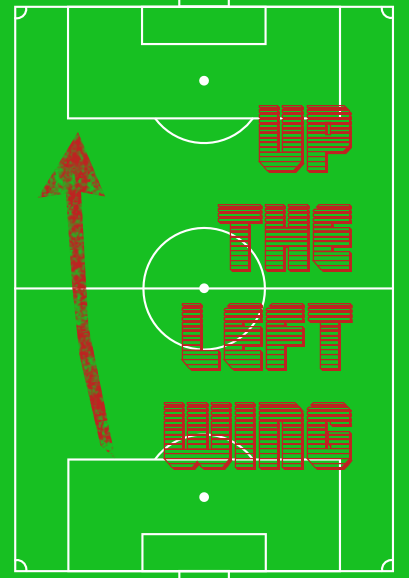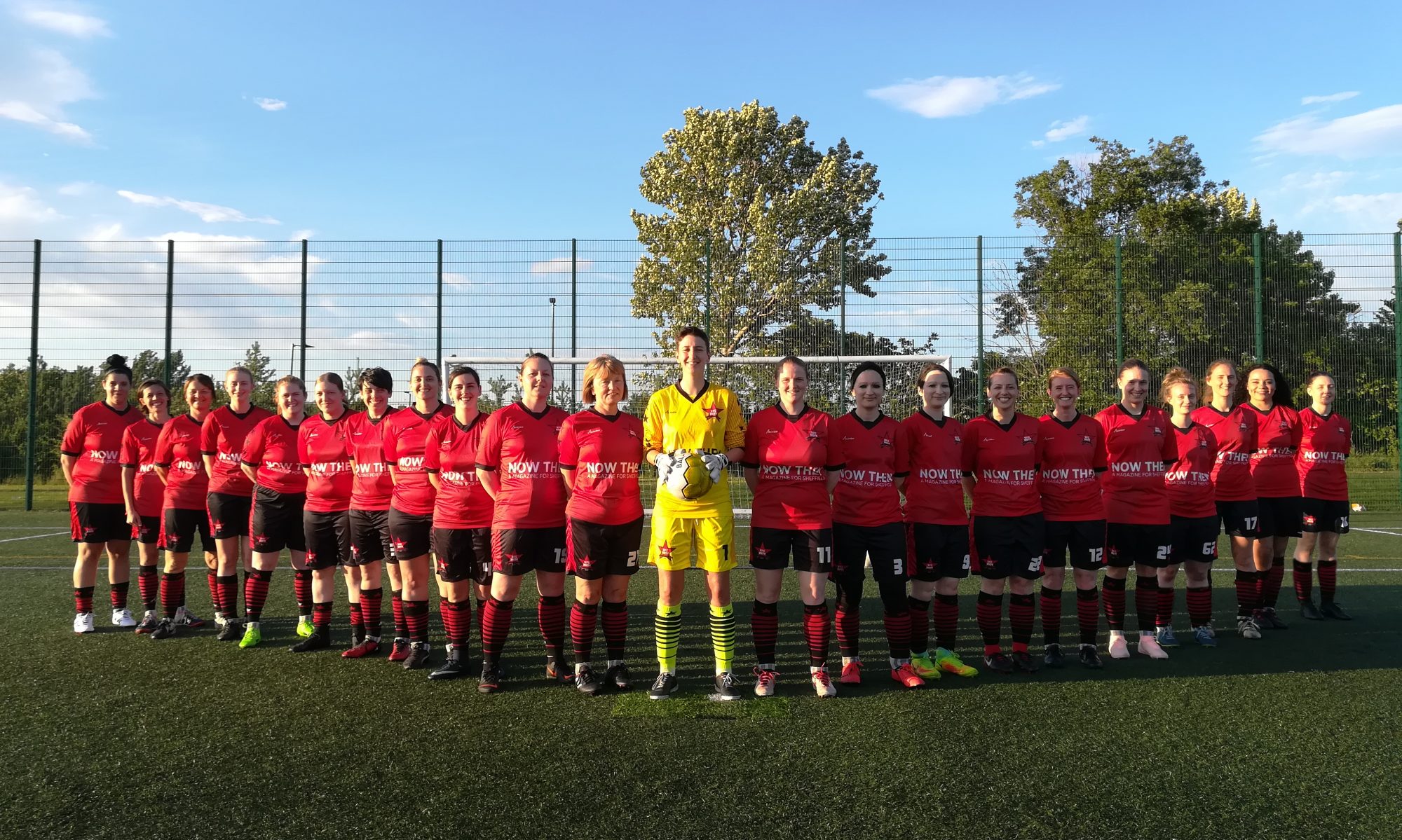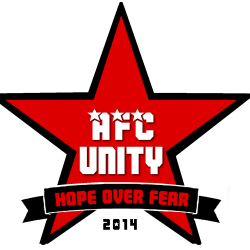by Jay Baker

On a mild spring day back in 2016, AFC Unity defeated Sheffield Wednesday Development 1-13 at their home of Hallam Sports Park.
It was only our second season in the league at the time, and we were one of only two women’s teams with absolutely no link to a pre-existing men’s team. We had little to no profile in the community. Our ethos wasn’t well-known or even clear within our own ranks. We were very much at the beginning of what we now know as a multi-award winning football club legally registered as strictly not-for-profit, subject to accounting scrutiny, with a first team as well as a unique and innovative beginner-friendly programme called Solidarity Soccer, and with a 2020 Vision.
So we’d had months where we struggled to recruit and gather and sign players. The league stressed that it was unlawful in the rules of the game to ever field a player whose registration hadn’t been submitted and completed – known in footballing circles as “a ringer.” Even when it hurt us, even when we lost heavily – even when we didn’t have enough players, even – we never, ever, once played a ringer; there were occasions where new players had to simply stand and watch from the sidelines, unable to help. We’ve never played a ringer, and never will. It’s how we agreed we’d conduct ourselves right from the start.
Right from our first league game, we suffered a culture clash with some other teams – they’d shout inappropriate remarks, cheat, and – yes – play ringers. One such occasion cost us the win over a side that was the top of the division on that very day, right in the dying seconds; they’d made a phone call to a friend from the Midlands, who pretended to be someone so completely different it was almost amusing, and stopped us dead in our tracks. And one weeknight, we played an eventual championship-winning team with just eight players available for us, so as to fulfil the fixtures for the league – the inevitable heavy defeat saw me stood alone watching my gutsy players battle a team who put nearly ten goals past us and celebrated every single one like it was the realisation of a life-long dream and then gathered on the pitch to enjoy their title-winning celebrations. We swallowed our pride, did the job, and went home. That’s football. It happens.
“Soccer is not about justice,” said sports historian Pete Davies. “It’s a drama – and criminally wrong decisions against you are part and parcel of that.”
So on that day when we beat Sheffield Wednesday Development by an incredible 12-goal margin, it felt like maybe something had gone our way. Here was this massive football club, with dozens of teams at different tiers, and a phenomenal infrastructure and financial backing, with its women’s development side who had played us (and beat us) before, playing against little AFC Unity – and we were battering them. They were even down a player for periods of the match; their bench was pretty much non-existent. But you’d have assumed everyone else outside the world of Wednesday would have been rooting for us nonetheless.
Not so.
From day one, we wanted to build an independent women’s football club that was a safe space for women, where women are empowered, and the coaching comes from that feminist perspective; we wanted justice – if not always found on the field, as Pete Davies knew full well – to be fought for in our community campaigns, like Football for Food, and Unity For All. We coached players more and more in a collective style of football, and we wanted them to see how different our inclusive, collective approach was, and choose that and fight for that too, play for our badge and only ours.
I should say here that Sheffield Wednesday Development have always been one of my absolutely favourite teams to play against and still are: their players rarely if ever cheat, the coaching staff are always amiable no matter who they are that season, and the behind-the-scenes staff are some of the absolute very best in the league, or indeed anywhere. They also play beautiful football, with quick passing players. A game against them is never stressful, never an ordeal (as it is with some teams, trust me) and always a pleasure, and long may that continue. Win, lose, or draw, the experience is always positive.
But on that spring day when we played Sheffield Wednesday Development, one league official on the day actually asked me, since I had a full bench, if I’d considered letting my players instead pull on a Wednesday shirt and play for them – a ringer. The Wednesday coach on the day, who I’d known quite well and was on very good terms with, also made a joke about borrowing some of my players. And while I felt bad for him, as this situation was by no means necessarily his fault – being as he was a mere cog in a gigantic machine – I felt this was a lesson to be learned in women’s football, that if you don’t promote your team well, you don’t recruit well, and you don’t retain players well, you will be punished – even, dare I say, must be punished. Wednesday, of all clubs, surely deserved that lesson; their personnel committed to women’s football deserved it too, so they could cite the experience as part of demands for better support from almighty Chansiri. And who better than little AFC Unity to deliver such a message? We never ever once blamed anyone else for our shortcomings; we always took it upon ourselves to do something about it. Even now, with the 2020 Vision. We take responsibility for our own inadequacies on the day.
And yet there I was, simply high-fiving my players after each goal (as became Unity tradition), albeit with decreasing enthusiasm as we approached the certain safety of double figures, and my assistant coach at the time (who I’m still friends with and who I hold in very high regard), a former Wednesday player herself no less, suggested I perhaps not even go for my patented high-five, out of respect for Wednesday. A couple of players (who later left our club to play for more traditional teams) also suggested it wasn’t sporting of me. Even the opposing coach, who always dropped me a line once in a while, didn’t speak to me for a very long time after that day. That 1-13 scoreline was Unity’s highest win in our history, a record victory that still remains today. And yet I could have perhaps enjoyed it a little more. I wasn’t really allowed to. After all, I was just a Unity guy. I needed to know my place. And yet you can bet that no one would have treated the Wednesday coach like this had the scoreline been reversed – hey, they were Chansiri’s Sheffield Wednesday, for goodness sake! (In fact, Chansiri himself, a Thai businessman, has arguably been the bane of women’s football at that club)
The natural order of things preferred by the traditionalists of football was soon restored anyway. The aforementioned league official at the time saw nothing wrong with teams battering us heavily from time to time, including a record 17-0 defeat. The clique of players who left us to join more traditional teams, sure enough, cheered every single goal they put past us, including in high-scoring games where their aim became a challenge to see how many different defensive players they could set up to get on the scoresheet.
And three years later, Sheffield Wednesday Development hosted us again. This time, they defeated us. The result? 13-1. Unlike us, they kept to their principles and celebrated every single goal, right to the end. So did every other team that beat us heavily last season. In one heavy defeat for us, an opposing supporter shouted “Yeah, up yours, Unity!” as we conceded a goal. As per the natural order, I stood there and took it as the abuse was thrown and the goals flew in, one after another. We all did.
Given the natural order of things – the privileged sense of entitlement from bigger clubs or teams with a traditional, army camp approach – it’s not looking likely, but you can bet I’ll enjoy it a lot more if I ever get the chance to coach Unity to a high-scoring victory. Why should I be punished for another team’s shortcomings and failures? Our failures have nothing to do with failing to recruit or retain players, wasting money, dodgy brown paper packets of cash by unincorporated association football clubs, or chastising or berating players subjected to punishments for mistakes. No, our failures, if you can even call them such, are trying so terribly hard to be something so very different: we’re not football for the sake of football; we’re about social justice, we’re about people and not profit, and we’re about promoting women’s football in a way that stands on its own merit, with no connection to a men’s team at all in any way. We wanted to empower women, and tackle sexism.
There’s enough sexism in soccer as it is, from bottom to the very top. Officials often condemn foul language more than actual fouls in the football because they believe women should act much different to the men; they should be seen as “lady-like.” It’s in the culture: we still see women’s teams called “ladies'” teams, where there are no “gentlemen’s” teams. It’s absurd. Sports sites treat women’s football like an add-on or an afterthought with sub-headers under “football” as though by “football” you’re already only just talking about the men’s game. They don’t do that with tennis – it’s either men’s tennis, or women’s tennis; not “tennis” and then the special little thing called “women’s tennis.” And don’t give me that nonsense that men are better, have a bigger following and so are paid more, because in the United States, the women are more famous, more successful, and just quite simply better in every way in world soccer, and have still been subjected to worse facilities, worse travel arrangements, and worse food.
The USA national women’s team – captained by Megan Rapinoe, who stood in solidarity with Colin Kaepernick and others – has actually stood up and made a legal challenge to the governing bodies to attain equal pay. Essentially the American antidote to Trumpism, these women have been far more positive role models than some of the more Trump-esque drug-fuelled, sex pest behaviour of the men whose names we see on shirts in stores for ridiculous amounts of money. Neymar even openly supports the current fascist Brazilian President Jair Bolsonaro.
The USA national women’s team act like a true collective: strong women, they have each other’s backs, they root for each other from the sidelines, and they stand up for one another. With the lawsuit and related sexism, it’s easy to imagine it must feel like them against the whole world. They have to try harder and be even better to earn their way.
No surprise then, when last night in the World Cup where goal difference is so absolutely crucial (not to mention sponsorship deals), the USA put thirteen goals past Thailand, and celebrated every single one, together, as a team. It was a warning shot to everyone else in the competition that they were aiming to retain their world title. Today’s subsequent response has been one of immense criticism, buoyed by the corporate media, that it was supposedly unsporting to celebrate their own success; that it was perhaps disrespectful to Thailand. I don’t understand this. Firstly, as mentioned, goal difference matters; it would have been far more obnoxious and overconfident to assume they wouldn’t need to secure their lead in the standings, not least if they’d played keep-ball and passed the ball around their opponents, which would have been perceived as humiliating them and toying with them. Secondly, again as mentioned, they are against the whole world – they want to win and they want to be dominant, not just for their own legal case and their own profile on the global sporting stage, but ultimately to open those doors for more sponsorship deals that then send a message of their financial worth. Ultimately, this isn’t AFC Unity we’re talking about here, where players pay to play – the USA team all know that this is their job, and the better they do, the more they should be paid. That’s the whole point.
And that brings me to my desire to see money taken out of football completely. I’ll address that next time in this column. Thanks for reading.
The views expressed in “Up the Left Wing” are those of Jay Baker and do not necessarily reflect those of AFC Unity or any of its personnel or players

